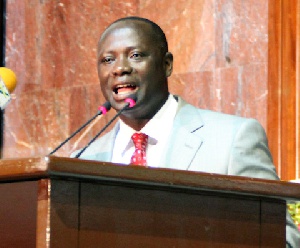Business News of Wednesday, 29 October 2014
Source: B&FT
Sleeping with appliances on costs money
Sleeping with electronic appliances turned on costs Ghanaian households between GH¢200 and GH¢270 per year on average, with laptop computers, mobile phone chargers, television sets and satellite boxes being the gadgets most commonly left in standby mode during sleeping hours.
That is according to a study by the Gramax Energy Group (GEG), an organisation advocating sustainable use of energy whose research also found that leaving appliances in sleep mode accounts for about 10-19 percent of the average electricity bill per year.
“When appliances are left in standby mode, they still use energy,” the study’s author, Maxmillian Kwarteng, said. “For instance, the 58 percent of Ghanaian households that have access to television sets waste about 139,200 kilowatts per hour of energy a day when their TV sets are on standby or sleep mode. And it’s just not about energy, it pushes electricity bills up.
“Completely turning off everyday appliances could be a swift and economical way for us to save on energy and our energy bills. It is very easy to lose money while we sleep with our appliances on.”
For the past two years the country has hardly produced enough electricity to avoid imposing blackouts on households every 24 to 48 hours. The shortage of generation has been blamed on erratic natural gas supply from Nigeria; plant shutdowns for maintenance; and low water levels at the Akosombo and Bui Dams.
The acute energy situation has forced regulators to turn their focus to energy conservation, with a campaign currently being run by the Energy Commission -- which licences the power producers -- that encourages the public to use energy efficiently.
It is estimated that 400 megawatts of power is wasted annually by Ghanaians through inefficient use of electricity. That is equivalent to one quarter of the country’s total electricity generation.
In June, the Energy Commission introduced a public education campaign, “Switch off the Freezer”, to reduce electricity consumption amid a significant shortfall in generation. The campaign advised households to turn off their deep freezers from 6pm. to 12 midnight to save between 200-300 megawatts of electricity.
There are 1.2 million freezers and two million refrigerators being used in Ghanaian households, and they account for more than half of domestic energy consumption.
According to GEG, the report is intended to help government and major stakeholders in the country’s energy sector better understand the dynamics of energy usage, and make Ghanaian households use power efficiently while saving cost.
“This study has shown that turning off electronic appliances completely is very economical as people will shed the extra cedi from our electricity bills, thus saving money and pushing the country toward its sustainable energy-use target,” it said.











